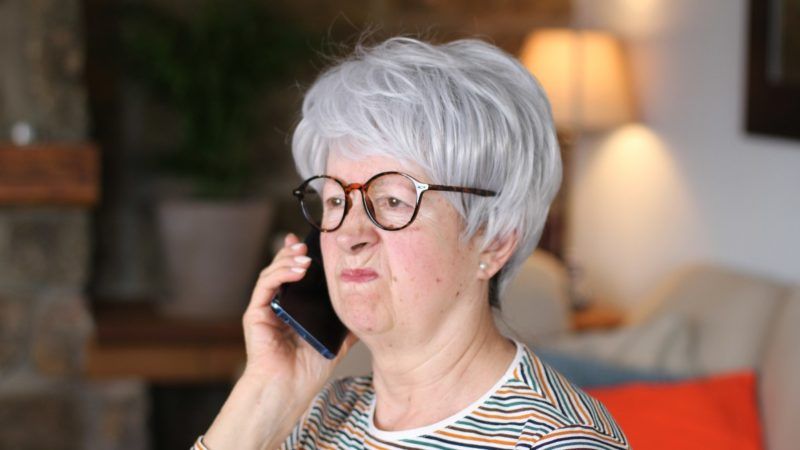No, We Don't Need Harsher Criminal Penalties To Fight the 'Karens' of the World
Politicians appear to have learned all the wrong lessons about over-policing.

Two California Bay Area Democrats are responding to the current push for police reform by giving police and prosecutors more tools to punish people.
San Francisco Supervisor Shamann Walton and Bay Area Assemblyman Rob Bonta (D–18th District) are teaming up to introduce a local ordinance and a state bill, respectively, that will create both criminal and civil penalties for those who use 911 calls in order to harass people on the basis of their race, religion, sex, or other protected status.
In San Francisco, Walton dubbed his proposed ordinance the Caution Against Racially Exploitative Non-Emergencies Act, or CAREN Act, an obvious allusion to recent viral news stories about white women who use the police to harass people, commonly referred to as "Karens." Walton said Tuesday the purpose of the ordinance is to create "consequences" for people who would weaponize 911 with racist intentions.
But California already has laws against false 911 calls, so it's worth exploring what these proposals actually do. Under current state law, a fake 911 call is a misdemeanor with a maximum sentence of 1 year in jail and a fine of up to $1,000. If the 911 response to a false call results in death or great bodily injury, the crime becomes a felony with a larger possible fine and a longer maximum sentence.
Bonta's Assembly Bill 1550 (A.B. 1550) would make a person who is the subject of an unnecessary police call a "victim," and allow prosecutors to use the state's hate crime law enhancement against the 911 caller.
Determining whether a person has malicious intent when calling 911, or whether they've actually misinterpreted another person's behavior is its own can of worms. But there's more to A.B. 1550 than this, and the full text doesn't seem to be getting much attention in the media reports I've read.
A.B. 1550 also permits anybody who is affected by one of these false 911 calls to take the caller to court and attempt to recover civil damages. This does not require that the caller be convicted in a criminal court of making a false 911 call, only that the plaintiff prove that race-, sex-, religion-, or other protected status-motivated call led to an encounter with a police officer during which police do any of the following:
- (1) Infringe upon the person's rights under either the California Constitution or the United States Constitution.
- (2) Unlawfully discriminate against the person.
- (3) Cause the person to feel harassed, humiliated, or embarrassed.
- (4) Cause the person to be expelled from a place in which the other person is lawfully located.
- (5) Damage the person's reputation or standing within the community.
- (6) Damage the person's financial, economic, consumer, or business prospects or interests.
The bill doesn't hold police liable for the above violations, just the person who called 911. And while criminal prosecutions of this law would require a high burden of proof, civil cases would conceivably see a lot of spelunking through 911 callers' social media accounts in search of wrongthink, or perhaps the commission of perfectly legal acts meant to antagonize someone into calling 911 simply as grounds to sue the caller. This bill might impoverish some Karens, sure, but it might also lead to the emergence of an entirely new archetypal nuisance. Either way, the bill seems like a civil lawsuit factory and a boon for trial lawyers.
These proposals dodge the real problem, and arguably make it worse: we have too many laws and too much policing of private behavior. The absurd logic of Walton's and Bonta's proposals is that we can fix overcriminalization by criminalizing even more behaviors.
And some people realize this approach is flawed, even when they themselves are the victims of a fake call. Christian Cooper was the victim of a false 911 call when a woman named Amy Cooper (no relation) called 911 during an argument the two had over Amy Cooper's unleashed dog in Central Park. Video of Amy Cooper calling the police and claiming that "an African-American man" was threatening her went viral, and led to Amy Cooper losing her job.
On Monday, the Manhattan District Attorney's office announced it plans to charge Amy Cooper with filing a false police report, a misdemeanor with a maximum 1-year jail sentence. But The New York Times reports that Christian Cooper, the ostensible victim of this crime, is refusing to cooperate with the prosecutor's office. "On the one hand, she's already paid a steep price," he said in a prepared statement. "That's not enough of a deterrent to others? Bringing her more misery just seems like piling on."
You don't fight Karen by being the bigger, more powerful Karen. Others in the criminal justice reform community have been trying to point out that prosecuting Amy Cooper is not the solution people seem to think it is. Josie Duffy Rice, president of the nonprofit criminal justice reform media outlet The Appeal, tweeted out a thread Monday explaining why she opposed Amy Cooper's prosecution, also linking to a piece she wrote in 2019 opposing Jussie Smollet's prosecution for fabricating a hate crime against himself in Chicago.
Some people responded to her on Twitter by arguing that Amy Cooper's actions could have gotten Christian Cooper hurt or killed by police. This is true. But locking up the Amy Coopers of the world will not fix our policing problems, particularly since many encounters where police use excessive force don't result from false 911 calls.
We can't fix America's police by prosecuting one, 10, or 100 Karens.


Show Comments (77)